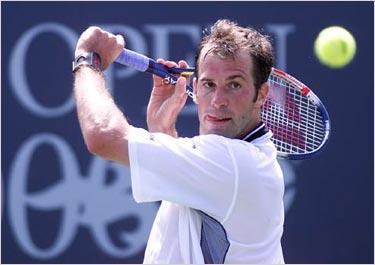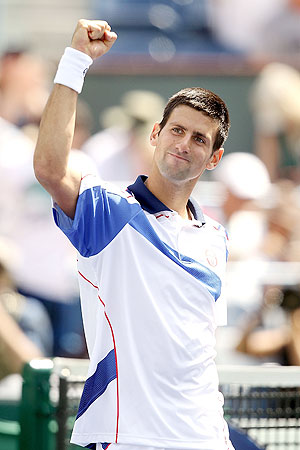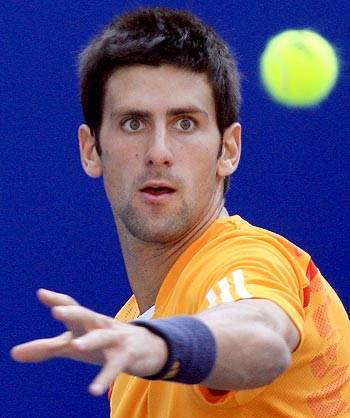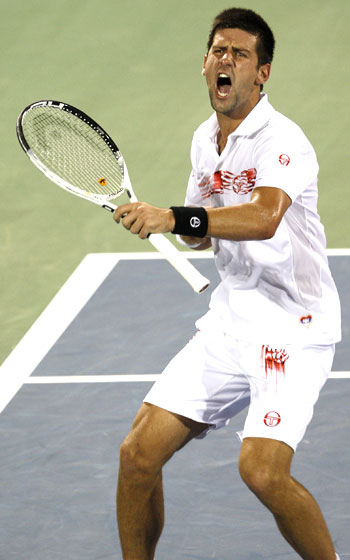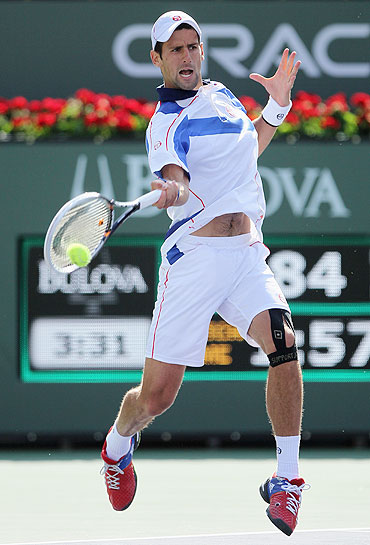 | « Back to article | Print this article |
Rusedski asks ATP to look after top players
The men's tour must look after the welfare of top players like Novak Djokovic rather than expect them to turn up injured at tournaments so they do not lose out on bonus payments, former British number one Greg Rusedski said.
Djokovic polarised opinion last week when he opted to compete at the Paris Masters despite aggravating an existing shoulder injury days earlier at the Basel Open.
However, if he had been a no-show in Paris, he would have sacrificed a $1.6 million pay cheque he was guaranteed to earn just for contesting a single point in the French capital.
The world's standout player of 2011 went on to win two matches before quitting in agony ahead of a much anticipated prime-time quarter-final showdown with local favourite Jo-Wilfried Tsonga.
'The bonus pool works on your yearly commitment'
While Djokovic's decision might have angered fans who had bought tickets for the match, Rusedski said the current system was to blame for the situation.
"If he (Djokovic) did not play (in Paris), he would have lost out on over a million pounds in bonus pool money so he wanted to give it a go," the 1997 US Open runner-up said.
"So he went out there and he played. He played two matches -- and then against Tsonga he didn't bother to go on court.
"The bonus pool works on your yearly commitment. So if you look at it in that respect, he deserves the money.
"The question being is should they have made an exemption rule possibly for him to give him his bonus pool money even if he didn't play Paris?"
'There should be an exemption rule if someone is truly injured'
"There should be an exemption rule if someone is truly injured... they should still be able to receive their bonus pool money. Because you work hard throughout the year and he's been the best player throughout the year so there should be no excuse why he shouldn't be paid it."
That is not, however, how the ATP sees it.
As World No 1, Djokovic was entitled to a $2 million bonus if he played all eight Masters 1000 events during 2011. The bonus was cut to $1.6m if he played seven of the eight. Anything less and the bonus was wiped out.
Since the Serb pulled out injured from the Shanghai Masters, he had to walk out on court in Paris -- healthy or not -- to pick up the bumper cheque following a season in which he won 10 titles, including three grand slams and five Masters crowns, to notch up a 69-4 win-loss record.'We have rules in place to make things fair to all players'
Athletes' welfare has been a hot topic this year and came to a head during the US Open in September, when a player revolt over "dangerous" playing conditions at rain-hit Flushing Meadows threatened to overshadow the tournament.
Injury-prone Rafa Nadal and Andy Murray complained bitterly about the crammed calendar and said players were being asked to put up with an unreasonable schedule that was starting to take a toll on their bodies.
However, the ATP said Djokovic made up his own mind about competing in Paris.
"The bonus pool was created as a special reward for top players who compete in all of our top events," an ATP spokesperson said.
"Novak has had a phenomenal year but we have rules in place to make things fair to all players and to support the structure of the Tour.
"Of course, as our members know, the ATP Board is able to review the application of rules in certain circumstances. Novak wanted to play and ultimately did what he thought was right."
'He's had 10 days to rest and hopefully he should be fine for the O2'
Although it was plain to see that contesting 73 matches over the past 11 months had left Djokovic nursing a battered body, Rusedski was confident the Serb would find the mental strength to last the distance at the O2 Arena in London, where the top eight men will battle it out at the season finale.
"He's had 10 days to rest and hopefully he should be fine for the O2," Rusedski said.
"I think Djokovic will be in good shape, he'll find a way (to last the distance) and once the O2 is done he'll have a few weeks to recover and get ready for Australia. I expect him to fit and don't think that will be an issue."

© Copyright 2025 Reuters Limited. All rights reserved. Republication or redistribution of Reuters content, including by framing or similar means, is expressly prohibited without the prior written consent of Reuters. Reuters shall not be liable for any errors or delays in the content, or for any actions taken in reliance thereon.
